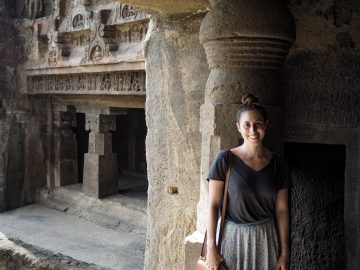Name: Devra Waldman
Expected Graduation: December 2019
Degree: PhD
Supervisor: Dr. Brian Wilson
Hometown: Toronto, Ontario

You are currently in India, can you tell us about the work/research you are doing?
I’ve been in India for the last two months doing some research for my dissertation. I’m based primarily in Gurgaon (a suburb of Delhi) and I’m doing an ethnography of sport-focused gated communities in the National Capital Region of India. In India, and especially in the areas around Delhi, there is a growing phenomenon of international and domestic real estate developers using sport/leisure brands and identities to anchor large-scale urban development projects. For example, there are large scale gated-communities called ‘Sports Cities’ which have PGA regulation golf courses, cricket stadiums, NBA regulation (and branded) basketball courts, Olympic-sized swimming pools and stadiums, and ‘world class’ facilities in badminton, squash, tennis, and soccer. These facilities are surrounded by over 6000 residences, private schools, and a private hospital.
For my research, I’m living in a gated, residential community and spending time with a variety of groups that are connected to or impacted by these spaces. This includes developers, architects, government officials, and residents. I’ve also done multiple site visits to a variety of sport-focused residential developments in the National Capital Region, and have attended various conferences on urban land development regulations in India.
The overarching goal of this study is to better understand how these spatial developments come to be, the multiple/contested meanings of these spaces, the place/role of sport/leisure in the building of home and place, the politics of inclusion/exclusion of these spaces, and how the development of these spaces is connected to broader financial capital and legacies of colonialism.
Tell us about a highlight from the experience:
In terms of research, it has been great to meet different people that are connected to these developments in different ways. For example, I’ve met international architects, government officials and urban planners, consultants, real estate developers, residents/home buyers, individuals in financial institutions, and others. Doing this helps to gain a better understanding of the intricacies, complexities, and (un)intended consequences of these sorts of development projects — and how a gated community that is unique to a particular area is built from relationships and impacts those beyond the confines of its gates. A side highlight has been a trip to the Taj Mahal — can check that off the bucket list, and can confirm that it is better in person than in photographs!
Did anything surprise you?
While there have been many, many surprises (that’s the beauty of fieldwork), I’d say the big thing was just seeing the size, scale, and scope of these sorts of developments — and the disjuncture this has with town/government planning that seems unable to keep up with the pace of development. I think a Town Planner from Gurgaon that I met summed it up best when he described development in the area to me. He explained that if you come to Gurgaon and you look up, it looks great. Beautiful buildings, residences, corporate parks. But if you look down, you see broken or unfinished roads, a lack of drainage, poor water distribution, poor waste management, and a general lack of infrastructure — the two don’t seem to add up. In effect, you have a city of islands that are self-contained yet are largely isolated and disconnected from all the other islands.
Why did you choose to do your graduate studies with UBC Kinesiology?:
It’s a fantastic program! I feel incredibly lucky to work with Brian and to have such a supportive department. It’s a privilege to have the opportunity to learn and grow from the professors and my fellow graduate students every day.
What advice to have for your peers?:
Make sure you follow your gut and go with a dissertation topic that you find interesting. Also, don’t be afraid to take breaks and recharge, you need it!
What do you hope to do after graduation?:
I hope to be working at a university somewhere continuing to do research on urban development, politics of space, and (post)colonialism. I’m also really looking forward to teaching classes to undergraduates and working with students.